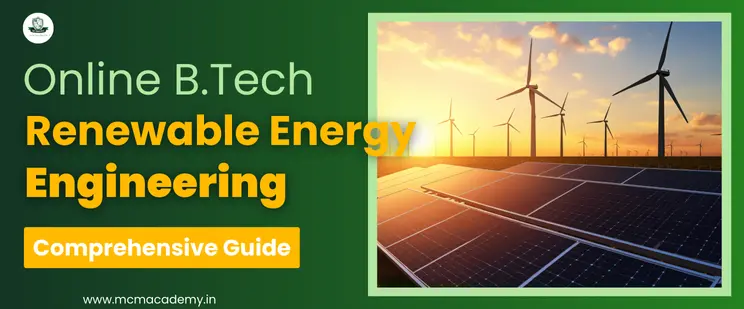The Bachelor of Technology (B.Tech) in Renewable Energy Engineering is a specialized undergraduate degree that studies sustainable energy sources and technologies. It discusses a variety of issues, including solar and wind energy, biomass, hydroelectric power, geothermal energy, and energy storage technologies. The program combines engineering fundamentals with environmental issues, regulatory frameworks, and economics of renewable energy. Students learn how to design, develop, and manage renewable energy systems through theoretical coursework, laboratory experiments, and hands-on projects. The emphasis is on innovation, efficiency, and sustainability in energy generation and consumption. Graduates are prepared to seek positions in renewable energy companies, government agencies, research institutes, and consulting firms as renewable energy engineers, project managers, energy analysts, and sustainability consultants.
B.Tech Renewable Energy Engineering Course Details
| Degree | Bachelors |
| Full Form | Bachelor of Technology in Renewable Energy Engineering |
| Duration | 4 Years |
| Course Fees | INR 1.5 – 3 LPA |
| Average Starting Salary | INR 3-4 LPA |
| Job Roles | Solar Power Engineer, Solar PV Designer, Electrical Engineer, Research and Development Engineer, Monitoring & Field Testing Engineer, etc. |
Eligibility Criteria for B.Tech Renewable Energy Engineering
To pursue a B.Tech in Renewable Energy Engineering, certain eligibility criteria must be met. Candidates should have completed their higher secondary education with a strong foundation in physics, chemistry, and mathematics. Additionally, many institutions require a minimum aggregate score in these subjects. Entrance exams are another crucial aspect of eligibility. Candidates often need to clear exams like JEE Main or state-level engineering entrance exams to secure admission. These exams test the candidate’s knowledge in subjects like physics, chemistry, and mathematics. Furthermore, some universities may have specific eligibility requirements such as age limits or residency criteria. It is essential for aspiring students to thoroughly research and understand these criteria before applying.
How To Get Admission for B.Tech Renewable Energy Engineering?
To get admission for B.Tech Renewable Energy Engineering, follow these steps:
- Research Programs: Look for universities offering B.Tech in Renewable Energy Engineering.
- Check Eligibility: Ensure you meet the admission requirements like minimum grades in science subjects.
- Entrance Exams: Prepare for entrance exams like JEE Main or specific university exams.
- Application Process: Fill out applications with the necessary documents before the deadline.
- Scholarships: Explore scholarship opportunities for financial assistance.
- Campus Visits: Attend open house events or take virtual tours to get a feel of the campus.
- Recommendations: Gather recommendation letters highlighting your academic prowess.
- Personal Statement: Write a compelling statement outlining your passion for renewable energy.
- Interview Preparation: Be ready for interviews that some universities may conduct.
- Stay Informed: Keep track of admission notifications and be proactive in responding.
Popular Entrance Exams for B.Tech Renewable Energy Engineering
Here is a list of some of the popular entrance exams that you should consider aiming for:
| JEE Main | Conducted by the National Testing Agency, JEE Main is a prominent entrance exam for admission to top engineering colleges in India, including NITs and IIITs. |
| JEE Advanced | Those aiming for IITs need to clear JEE Advanced, the gateway to the prestigious Indian Institutes of Technology. |
| BITSAT | Birla Institute of Technology and Science Admission Test is another key exam for securing a seat in BITS campuses offering B.Tech programs. |
| VITEEE | VIT Engineering Entrance Examination is the entry point to Vellore Institute of Technology’s B.Tech programs. |
| SRMJEEE | SRM Joint Engineering Entrance Exam is conducted by SRM Institute of Science and Technology for admissions to its B.Tech courses. |
| COMEDK | For engineering colleges in Karnataka, COMEDK UGET is a popular choice. |
| UPSEE | Uttar Pradesh State Entrance Exam for admission to colleges in Uttar Pradesh. |
| WBJEE | West Bengal Joint Entrance Examination for engineering institutes in West Bengal. |
| MHT CET | Maharashtra Common Entrance Test for engineering courses in Maharashtra. |
| KEAM | Kerala Engineering Architecture Medical entrance exam for colleges in Kerala. |
Top 10 B.Tech Renewable Energy Engineering Colleges in India
Here’s a list to help you make an informed decision:
| Indian Institute of Technology (IIT), Bombay | National Institute of Technology (NIT), Trichy |
| Delhi Technological University (DTU) | Birla Institute of Technology and Science (BITS), Pilani |
| Manipal Institute of Technology, Manipal | Vellore Institute of Technology (VIT) |
| SRM Institute of Science and Technology, Chennai | College of Engineering, Pune |
| Indian Institute of Information Technology (IIIT), Allahabad | National Institute of Renewable Energy (NIRE) |
Why Choose B.Tech Renewable Energy Engineering?
Here’s why you should consider pursuing a degree in B.Tech Renewable Energy Engineering:
- Dive into the world of clean energy sources such as solar, wind, and hydroelectric power.
- Learn about cutting-edge technologies shaping the renewable energy sector.
- Gain hands-on experience through practical projects and internships.
- Explore the potential of sustainable energy solutions in addressing global environmental issues.
- Collaborate with industry experts and researchers to drive innovation in renewable energy.
Salary of B.Tech Renewable Energy Engineer
The average starting salary for freshers ranges from INR 3-6 lakhs per annum. With experience, professionals in this field can earn significantly higher, reaching up to INR 10-15 lakhs per annum or more. Renewable energy is a rapidly growing sector in India, creating a high demand for skilled professionals. This demand translates into attractive salary packages for B.Tech graduates specializing in Renewable Energy Engineering.
Career Options After B.Tech Renewable Energy Engineering
Here are some career scopes for B.Tech Renewable Energy Engineering graduates:
| Job Roles | Description |
| Solar PV Engineer | Renewable Energy Engineer |
| Wind Energy Analyst | Energy Consultant |
| Research and Development | Project Management |
| Environmental Analyst | Renewable Energy Systems Engineer |
Skills That Make You The Best Renewable Energy Engineer
Here are some of the skills required to become the best Renewable Energy engineer:
| Technical Proficiency | Leadership Qualities |
| Problem-Solving Skills | Communication Skills |
| Analytical Skills | Adaptability and Flexibility |
| Teamwork | Attention to details |
FAQs
Is B.Tech Renewable Energy Engineering a promising career choice?
Yes, B.Tech Renewable Energy Engineering is a highly promising career choice due to the increasing global demand for sustainable energy solutions and the growing focus on environmental conservation.
What are the job prospects for graduates in B.Tech Renewable Energy Engineering?
Graduates in B.Tech Renewable Energy Engineering have diverse job prospects, including roles in solar energy, wind power, biomass energy, and energy efficiency sectors. They can work as renewable energy engineers, project managers, research analysts, and consultants.
What core subjects are covered in B.Tech Renewable Energy Engineering programs?
Core subjects covered in B.Tech Renewable Energy Engineering programs include renewable energy sources, energy conversion systems, sustainable energy policies, environmental impact assessments, and project management in renewable energy projects.
How can B.Tech Renewable Energy Engineering students contribute to a greener future?
B.Tech Renewable Energy Engineering students can contribute to a greener future by developing innovative renewable energy technologies, promoting energy efficiency practices, conducting research on sustainable energy solutions, and advocating for policies that support renewable energy adoption.























